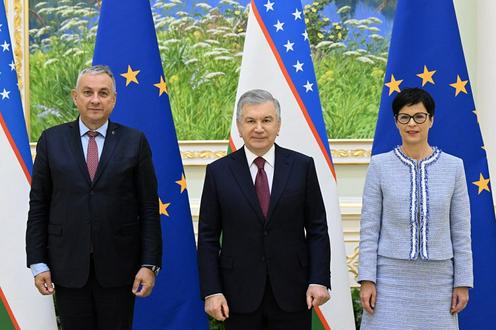 Yozef Sikela, Shavkat Mirziyoyev, and Marta Kos. Photo: Press service of the president of Uzbekistan.
Yozef Sikela, Shavkat Mirziyoyev, and Marta Kos. Photo: Press service of the president of Uzbekistan.
The European Union (EU) and international financial institutions are prepared to support Central Asian countries in developing the Trans-Caspian transport corridor—also known as the Middle Corridor—by allocating significant funds for infrastructure and related projects. Several important documents were signed at the Trans-Caspian Corridor and Connectivity Investors Forum, held on November 27 in Tashkent, Uzbekistan, Gazeta.uz reported.
EU Commissioner for International Partnerships Yozef Sikela and EU Commissioner for Enlargement Marta Kos took part in the event. Participants discussed in detail the potential of logistics routes connecting Europe with Central Asia via the South Caucasus and the Black Sea region. They emphasized the need for coordinated cooperation, the removal of barriers, and the harmonization of legal norms and customs procedures.
Uzbekistan’s transport minister, Ilkhom Makhkamov, said the Middle Corridor is becoming one of the key routes linking China, Central Asia, and the Caucasus with Europe. Experts project that by 2030, cargo volumes along this route will reach 10 million tons per year. However, he noted that the region must address a number of challenges together to create a unified Eurasian transport space.
Sikela stressed that real investment in ports, roads, digital systems, and business conditions helps advance work in clean energy and critical raw materials—areas in which the EU and Central Asia have shared interests.
Kos underscored another reason why developing the route is essential: overreliance on a single corridor makes trade participants vulnerable. A long-term alternative to the Northern Corridor is therefore needed.
“Cargo flows along the Middle Corridor have quadrupled since 2022. By 2030, they could triple again, provided the necessary investments are made,” Kos said.
The forum concluded with the presentation of several development projects. The European Investment Bank will extend a €100 million loan, backed by EU guarantees, to modernize a section of the international A380 highway near Nukus, the capital of the sovereign Republic of Karakalpakstan within Uzbekistan.
The EU and the European Bank for Reconstruction and Development (EBRD) will finance a feasibility study for a combined road-rail project connecting Uchquduq and Kyzylorda. The route will link two industrial centers in Uzbekistan and Kazakhstan, expanding Central Asia’s transit potential.
Additional reconstruction is planned on highways that form part of the Trans-Caspian corridor. European partners will open a €150 million credit line for related initiatives in Kazakhstan and allocate more than €50 million to upgrade the Karabalta–Chaldovar road in Kyrgyzstan. Another project will improve port infrastructure in the Kazakh city of Aktau on the Caspian Sea, with €10 million coming from the EU and €35 million from the EBRD.
During their visit to Tashkent, Commissioners Sikela and Kos met with Uzbek President Shavkat Mirziyoyev. The president congratulated the guests on the successful Central Asia–EU Economic Forum and the Trans-Caspian Corridor Investors Forum.
Mirziyoyev noted that several significant agreements between Uzbekistan and the EU were signed this year, major summits were held, and negotiations on Uzbekistan’s accession to the World Trade Organization were completed.
Economic ties are also expanding: since the start of the year, trade turnover has increased by nearly 7%. Both sides highlighted the need for further cooperation in trade, investment, industry, transport, digitalization, critical raw materials, energy, healthcare, and other sectors.
The Trans-Caspian transport corridor—also known as the Middle Corridor—is a route running through China, Kazakhstan, the Caspian Sea, Azerbaijan, and Georgia. It effectively serves as an alternative to Russia’s Trans-Siberian Railway for shipping goods from China to Europe.









